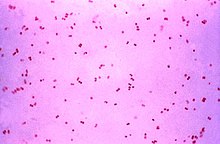Parametritis

Parametritis, (also known as pelvic cellulitis) is an inflammation of the parametrium (connective tissue adjacent to the uterus).
It is considered a form of pelvic inflammatory disease. It is a type of a Puerperal infection or postpartum infection, which is an infection that occurs when bacteria infect the uterus and surrounding areas after a woman gives birth. It's also known as a postpartum infection.
While there are several types of postpartum infection, Parametritis is inflammation of the ligaments around the uterus. As opposed to endometritis or myometritis, which are infections of the uterine lining and uterine muscle, respectively.

Parametritis is different from perimetritis which is inflammation of the serosa surrounding the uterus.
Sign and Symptoms
These symptoms can occur several days after the discharge from hospital after birth, hence it's critical to check for signs of infection even after the discharge. Some of these could include:
- Fever
- Headaches
- Chills
- An increased heart rate
- Lack of appetite
- Experience pain in the lower abdomen
- Vaginal discharge that is smelly
- Feeling discomfort of illness
Cause

| Scientific classification | |
|---|---|
| Domain: | Bacteria |
| Phylum: | Proteobacteria |
| Class: | Betaproteobacteria |
| Order: | Neisseriales |
| Family: | Neisseriaceae |
| Genus: | Neisseria |
| Species: | N. gonorrhoeae |
| Binomial name | |
| Neisseria gonorrhoeae(Zopf 1885) Trevisan 1885 | |
| Synonyms | |
| * Micrococcus der Gonorrhoe Neisser 1879 * Gonococcus neisseri Lindau1898 | |
The infection usually appears after a woman has given birth or has had an abortion. The main cause of this infection is when a bacteria that causes infections become present in the uterus after giving birth or having a D&C. This infection falls under the pelvic inflammatory disease (PID) and the bacteria that causes these infections are N gonorrhoeae and C trachomatis.
Mechanism/Pathophysiology
Parametritis is caused by infection in the uterus and spreads to the connective tissue of the pelvic floor. The infection spreads via lymphatics through uterine wall to connective tissue of broad ligament or entire pelvic floor.
Diagnosis
Parametritis can be diagnosed by a pelvic examination, blood test, and/or vaginal or cervical swab.
Acute and chronic parametritis
There are two forms of parametritis: acute parametritis and chronic parametritis. Acute parametritis would be diagnosed by the symptoms of elevated temperature and pulse as well as slightly uncomfortability . Chronic parametritis the symptoms of the disease are more intense and serious than the acute parametritis this also tend to cause other underlying problems like gonorrhea.
Prevention/Treatment
Parametritis is a extremely rare infection that there is not much information on the disease. When a woman is giving birth or having a procedure done in the uterine area doctors are sure to either start a antibiotic before the procedure or prescribe antibiotics afterwards to prevent infections. Postpartum infections are treated depending on the stage of the infection. Parametritis is usually treated with Parametrite therapy, including oral antibiotics to prevent further spread of the infection. A broad spectrum of antibiotic could be given such as fluoroquinolone (ciprofloxacin) in combination with metronidazole for about 5-7 days. In acute stage, the patient might need to be hospitalized. To reduce inflammation on the site, a cold pack is placed on the anterior abdominal wall and best rest is advised. Anesthetics and antipyretic drugs are used. If hospitalized an IV of calcium chloride with 150 xls of 3% solution would be given only if an abscess breaches through the posterior vaginal canal or the anterior abdominal wall. If the infection becomes chronic then prednisalone is given daily in a dose of 20 mg for about 10 days with Indomethacin (NSAIDs).
Prognosis
If parametritis infection not cured, it could cause long term problems such as infertility, miscarriage, or damage to the reproductive system. Its important that this infection is diagnosed and caught early on. This infection can cause issues with pregnancy if a woman becomes pregnant with having the infection.
Epidemiology
Parametritis is commonly seen In women of reproductive age. This infection is so rare that there is no statistical information.
Research Directions
There has not been any research done in humans in over 10 years.